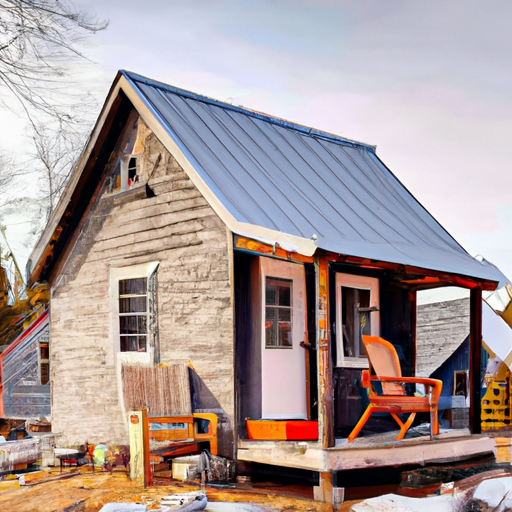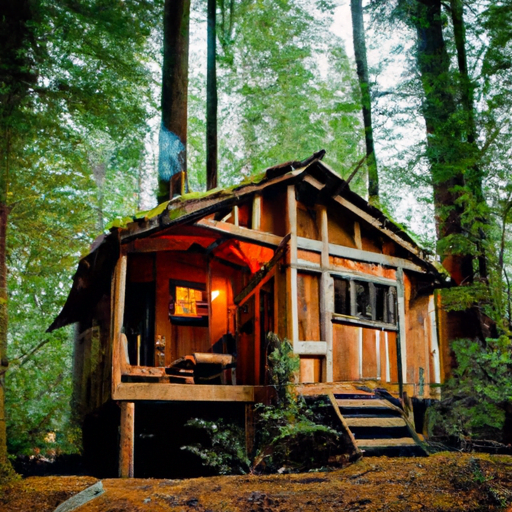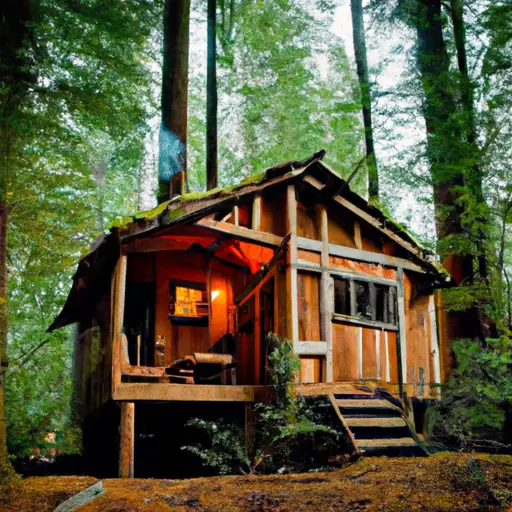So, have you ever thought about living off the grid? You know, disconnecting from the hustle and bustle of modern life and embracing a more self-sustaining lifestyle. It’s definitely an intriguing concept, but one that requires careful planning and consideration. One of the most important factors to consider is the cost of living in off-grid areas.
Now, you might be wondering, where is the cheapest place to live off the grid? Well, there are actually quite a few affordable options out there if you’re willing to do a bit of research. From remote areas in the United States like Arkansas and West Virginia to international destinations like Bolivia and Cambodia, there are plenty of places where you can live off the grid without breaking the bank.
In these places, you’ll encounter lower costs for things like land, housing, and utilities. Additionally, the cost of food and other necessities may also be significantly lower, especially if you’re willing to grow your own produce and rely on renewable energy sources. Of course, each location has its own unique benefits and challenges, which we’ll dive deeper into in the article. So, if you’re interested in exploring the cheapest places to live off the grid, stay tuned!

Exploring the Cheapest Places to Live off the Grid
Living off the grid has become an increasingly popular lifestyle choice for many individuals and families seeking independence, sustainability, and a deeper connection with nature. By living off the grid, you can reduce your dependency on utilities, have the opportunity to become more self-sufficient, and enjoy a greater connection to the natural world around you. But before making the leap to an off-grid lifestyle, it’s important to consider a few key factors and explore the cheapest places to live off the grid.
Reduced dependency on utilities
One of the primary benefits of living off the grid is the reduced dependency on utilities. By generating your own power through renewable energy sources such as solar panels or wind turbines, you eliminate the need for monthly utility bills, saving you a significant amount of money in the long run. Additionally, by utilizing rainwater harvesting systems and implementing water conservation techniques, you can reduce your reliance on the municipal water supply, further reducing your expenses.
Opportunity for self-sufficiency
Living off the grid provides you with the opportunity to become more self-sufficient. By growing your own food through organic gardening or raising livestock, you can have a steady and sustainable food source that is not only cost-effective but also healthier and more nutritious. You can also learn valuable skills such as food preservation and woodworking, allowing you to rely less on outside resources and rely more on your own capabilities.
Greater connection to nature
Living off the grid allows you to immerse yourself in nature and develop a stronger connection to the natural world. By living in remote locations away from the hustle and bustle of urban areas, you can enjoy peace and tranquility, breathe in clean and unpolluted air, and have access to stunning landscapes and wildlife. This connection to nature has the potential to improve your overall well-being and bring you a sense of fulfillment and contentment.
Before choosing the cheapest place to live off the grid, there are several considerations that you need to keep in mind:
Availability of natural resources
Living off the grid requires access to abundant natural resources such as sunlight, wind, and water. Before deciding on a location, it’s crucial to assess the availability and reliability of these resources. Areas with ample sunshine are ideal for solar power generation, while regions with consistent wind patterns are suitable for wind energy. Areas with access to a clean and reliable water source, such as rivers or groundwater, are also important for sustainable off-grid living.
Access to healthcare and emergency services
While living off the grid offers numerous benefits, it’s important to consider access to healthcare and emergency services. Remote off-grid locations may have limited access to medical facilities and emergency response teams. It’s essential to research the availability of healthcare services in your chosen area and determine if there are reliable emergency services nearby. Additionally, having a well-stocked first aid kit and some basic medical training can be beneficial for any off-grid resident.
Climate suitability
When choosing a place to live off the grid, it’s important to consider the climate in the area. Extreme temperatures, excessive rainfall, or prolonged drought can pose challenges to off-grid living. Before making a decision, research the climate patterns, seasonal variations, and any potential weather-related risks in the region. Finding a location with a climate that suits your preferences and allows for sustainable living practices is essential for a successful off-grid lifestyle.
Now, let’s explore some of the cheapest places to live off the grid in different parts of the world:
Central and South America
Central and South America offer a wide range of affordable options for off-grid living. Countries like Bolivia, Ecuador, and Nicaragua have a low cost of living, making them attractive choices for those seeking a simpler and more sustainable lifestyle. These countries also provide an abundance of natural resources, including plenty of sunlight and fertile land for agriculture. Additionally, many off-grid communities have formed in these regions, offering support and a sense of community for those embarking on this lifestyle.

Southeast Asia
Southeast Asia is another region that offers affordable options for off-grid living. Countries like Thailand, Cambodia, and Indonesia have a lower cost of living compared to many Western countries, making them popular choices for those seeking an off-grid lifestyle. The region is known for its warm climate and lush landscapes, providing an ideal environment for solar power and agriculture. The diverse cultures and traditional practices in Southeast Asia also offer unique cultural experiences and opportunities for community integration.
Eastern Europe
Eastern Europe is an often overlooked but affordable region for off-grid living. Countries like Romania, Bulgaria, and Ukraine offer a lower cost of living compared to many Western European countries. These countries have a rich history and picturesque landscapes, with remote and rural communities that can provide the perfect backdrop for off-grid living. Additionally, many of these countries have developed infrastructure and amenities that make the transition to off-grid living more manageable.
When deciding on the cheapest place to live off the grid, it’s important to consider the following guidelines:
Understanding personal needs and preferences
Everyone’s off-grid journey is unique, so it’s essential to understand your own needs and preferences. Consider factors such as climate, access to amenities, and the availability of healthcare services in relation to your desired lifestyle. Reflect on what sustainable practices and resources are most important to you and find a location that aligns with your values and goals.
Researching local regulations and laws
Before settling on a location, research the local regulations and laws pertaining to off-grid living. Some areas may have restrictions or requirements for certain off-grid practices such as water collection or solar power installation. Understanding these regulations beforehand will help you avoid any legal issues and ensure a smooth transition to your off-grid lifestyle.
Considering long-term sustainability
When choosing a place to live off the grid, it’s essential to think about long-term sustainability. Look for locations that have a stable and supportive community, access to education, and opportunities for growth. Ensure that the natural resources required for off-grid living, such as sunlight and water, are abundant and reliable. Building a sustainable and resilient off-grid lifestyle requires thoughtful consideration of these factors.
While exploring the cheapest places to live off the grid, there are additional factors to consider:
Education and schools for families
If you have a family or are planning to start one, it’s crucial to consider the availability and quality of education in your chosen location. Research local schools or consider homeschooling options if necessary. Communities with a strong commitment to education and supportive resources for families are important for the long-term well-being and development of children.
Connectivity and access to modern technology
Although living off the grid implies a certain level of disconnection from modern technology, access to connectivity may still be important for various reasons. Consider the availability of internet access or mobile coverage, especially if you work remotely or rely on technology for communication. Balancing a sustainable off-grid lifestyle with the benefits of modern technology is a personal decision that requires careful consideration.
Language barriers and cultural adaptation
Living off the grid in a foreign country may present language barriers and cultural adaptation challenges. Consider the local language and the level of cultural integration you are comfortable with. Learning the local language and cultural customs can enhance your experience and help you build relationships within the community.
While living off the grid offers numerous benefits, it also comes with its own set of challenges. Here are some common challenges and potential solutions:
Maintaining a consistent power and water supply
Off-grid living often requires generating your own power and managing your water supply. While reliable renewable energy systems and water collection techniques can be implemented, occasional maintenance and monitoring may be necessary for optimal performance. Regularly inspect your systems, educate yourself on maintenance procedures, and have backup plans in case of unforeseen issues.
Dealing with isolation and limited social interactions
Living off-grid in remote locations means less immediate access to social interactions. This isolation can lead to feelings of loneliness or boredom, particularly for individuals who are accustomed to a more socially active lifestyle. To address this challenge, seek out off-grid communities, engage in local activities, or consider joining online platforms or forums dedicated to off-grid living. Building a social network within the off-grid community can provide support, companionship, and shared experiences.
Addressing potential safety and security concerns
Living in remote areas can present safety and security concerns. Before choosing a location, research the crime rates and safety measures in the area. Consider installing security systems, developing emergency plans, and getting to know your neighbors for a sense of community security. Being proactive and taking necessary precautions will help alleviate safety concerns and allow for peace of mind in your off-grid lifestyle.
In conclusion, exploring the cheapest places to live off the grid requires careful consideration of various factors such as natural resources, access to healthcare, climate suitability, and long-term sustainability. Central and South America, Southeast Asia, and Eastern Europe offer affordable options with various perks and challenges. By understanding your needs, researching local regulations, and considering additional factors like education and connectivity, you can make an informed decision about the best place to live off the grid. Living off the grid can be a rewarding and fulfilling experience, providing you the opportunity to embrace a simpler and more sustainable lifestyle closer to nature.




